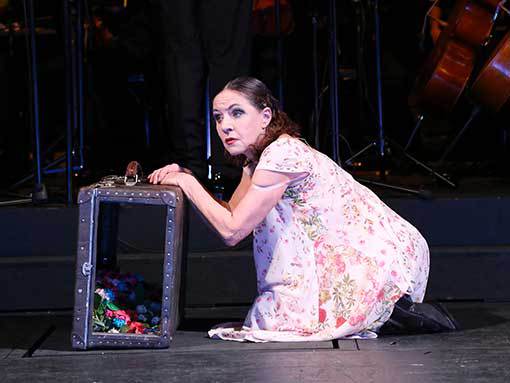Brno City Theatre hosted a musical performance which is quite uncommon yesterday. Entertainment and relaxing joking were replaced by satire and irony and pop songs by chansons. The Seven Deadly Sins of Kurt Weill and Bertolt Brecht got the form of an exhibition performance of the singer and actress Maria Bill.
This year, Theatre World Brno takes place at the National Theatre Brno and under its director Martin Glaser; the focus on German theatre is obvious. The majority of performances are represented by drama, but there are a few productions where music plays a major role. After the guest appearance of the Bavarian State Ballet a bit more modest performance of the Volkstheater Wien was staged yesterday. The Seven Deadly Sins (Die Sieben Todsünden) is a ballet with songs by Kurt Weill, the libretto was written by Bertolt Brecht; it was actually their last major collaboration. They had already achieved great success with The Threepenny Opera (Die Dreigroschenoper, 1928), their Happy End (1929) was a failure and the opera The Rise and Fall of the City of Mahagonny (Aufstieg und Fall der Stadt Mahagonny, 1931) was excellent. The Seven Deadly Sins was written when they were fleeing the Nazis and the premiere was in Paris in 1933.
The original idea of a ballet changed when Weill got the order to write the piece. The original dancing part of Anna was doubled with the one of singing and two sisters Anna I and Anna II appeared. They set off from Louisiana, America to major cities to earn a living for their family as bar dancers. These two characters are really ambiguous and the libretto leads us to believe that there is actually one person duplicated at the very beginning (we have one heart, one pair of shoes…). To assign both roles to one actress seems to be logical; however, in doing so the result is probably somewhat different from what the authors intended and wrote – at least the schism ambiguity is lost. And if in addition the subtitling equipment is missing, so that the audience have no idea what is going on, it is disturbing. The whole production depended on the Maria Bill’s performance, which was truly impressive.
Last year the Austrian singer and actor bid farewell to Volkstheater Wien after ten years by performing in this play and in this context the form of a gala concert has an absolutely different meaning. However the Czech audience probably does not know this, they have never heard the name of Maria Bill (let alone her singing) and the programme gives no concrete clue. The first surprise comes at the start, when Maria Bill accompanied by a piano begins to sing songs by Kurt Weill – she starts with Speak Low standard, several songs from the Three Penny Opera alternate with other titles, and the names of lyricists are projected on the black screen in the background.
Maria Bill sings in a dark voice, with a vigorous and careful diction in German, English and French; her charisma resembles Soňa Červená. Bill, however, is a bit monotonous and mechanical, she sings a thirty-five-minute block of songs in one piece with literally no interludes and with no pauses: she simply starts and she sings. All in all she has style; even though her clearly ironic tone seems to be missing in some songs (Zuhälterballade, Ballade von der sexuellen Hörigkeit). She is standing on stage in a black dress with a noticeable white boa, wearing conthurni shoes she looks like a statue. After the last song of the opening part the curtains draw open and there is the orchestra and the performance itself starts.
Maria Bill is more a singer than an actress and director Michael Schottenberg tailored the performance to her. He emphasized all her skills but he also reduced the play: The Seven Deadly Sins was only halfway, the missing ballet dancer was apparent. Acting and dancing was more or less a bizarre base for the singing than real theatre. At the same time, however, the vocal expression was emphasized and encouraged and in comparison with the first, concert part, it became more varied. Travels in the world of American big cities and their sinful traps were accompanied by changes in the variable costumes (Erika Navas). Marie Bill sailed through them on stage and her skills were probably used in full.
A spectacular performance was done by the orchestra, in which there were several famous persons – perhaps it was a part of the National Theatre Brno orchestra or some occasional body. It is important that it was conducted by Milan Turković in style, precisely, it was really well performed Kurt Weill. The style is mentioned twice for a reason; it was one of the main spectacles of the performance. A family quartet sang magnificently, the short solo of the first tenor was breath-taking. The piano player Alexander Lutz was excellently accompanying the first part.
The dramatic work of the Weill – Brecht duo is not often performed on our stages and Theatre World deserves praise for the fact that the production of Seven Deadly Sins was staged. Although the performance was very good, the question is, if this version could be introductory for the Czech audience. Surely it is good that in the theatre of easy-going musical entertainment there could be a place for serious and highly sarcastic musical theatre.
Kurt Weill, Bertolt Brecht: Die Sieben Todsünden (The Seven Deadly Sins). Musical production – Milan Turković, piano – Alexander Lutz, director – Michael Schottenberg, costumes – Erika Navas. Maria Bill, Volkstheater Wien ensemble. 19 October 2015, the Brno City Theatre. As part of the Theatre World festival.
































No comment added yet..